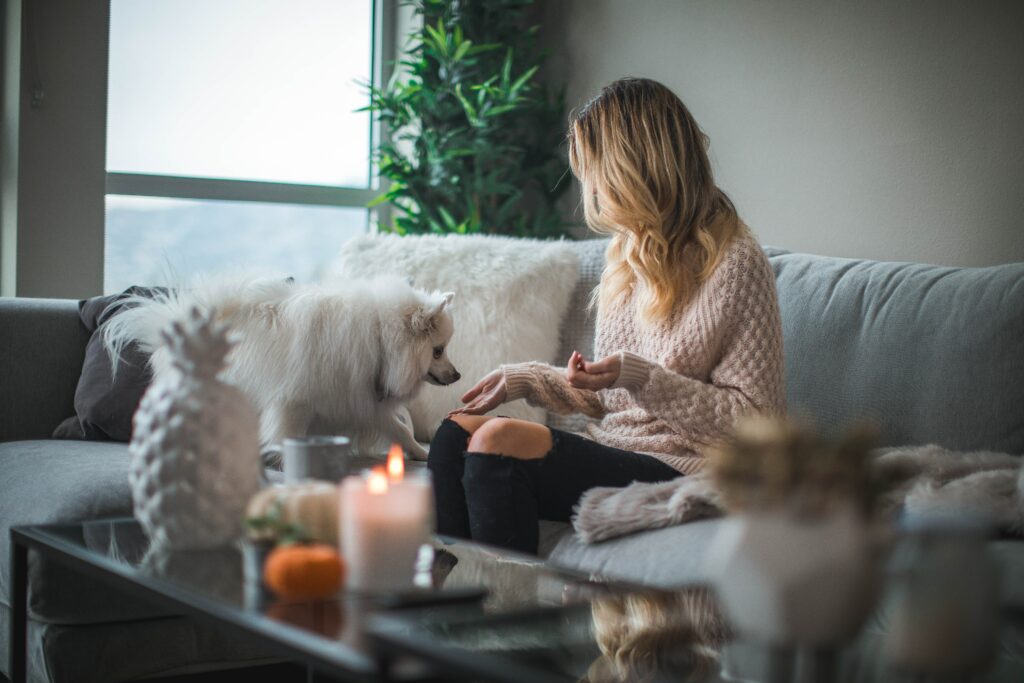
I bought a copy of Red magazine yesterday, to read in the bath. It’s a small treat, after a bad week beset with IT issues, migraines and arguments. And as I looked at the front cover, I thought, ‘That’s odd.’ Because instead of the usual fashionably dressed, slim hipped model adorning the cover, there’s a couple! And not just any couple – this handsome pair are walking along the beach, arms wrapped round waists, and wearing matching cable knit jumpers. It’s a vibe. And that’s when I twigged – it’s cuffing season.
For those not in the know, cuffing season refers to that time between November and March when the weather gets colder, the nights get darker and, if you’re single, you might find yourself wanting some company to while away those long winter nights.
But before you go ahead and cosy up, it’s worth examining what’s behind this seasonal need to settle down.
What causes cuffing
The drivers behind cuffing season, alongside the long, dark nights, are the holidays – specifically the expectation of a coupled up Christmas. In practically every festive film, or channel 5 seasonal special, there’s a potential pair just waiting to get together. Their love story plays out alongside a backdrop of Christmas trees, fireworks, festive sweaters and walks in the snow. This romantic pressure can also be compounded by social media, seasonal love songs and interest from well meaning friends and family.
If this sounds familiar to you, then sex and relationship therapist Mim Kempson, suggests thinking about whether a seasonal relationship is really what you want at all. Speaking to Fashion Journal, she says, “The best way to find out whether something is ‘healthy’ is to ask ourselves, ‘Am I okay with the effects this choice has on my life?’.
“Is opting into cuffing season making you anxious, chipping at your self-esteem, subtracting from your personal goals, work or other relationships? If yes, it’s probably unhealthy. Consider whether being in this situation aligns with who you are and where you’re headed in life.”
But what else is there to do in the winter?
Rather than coupling up in cuffing season, the winter’s a great time to lie fallow and consider your needs for the coming year. The dark nights and cold weather, can make it hard to work up the motivation to go outside. Let alone get dressed up to go on a date. So capitalise on the urge to stay in.

Sophie from Colchester, used to succumb to cuffing season. But now realises that winter without a significant other works much better for her.
“I always felt that winter wasn’t worth doing unless I had someone with me through the cold nights. I’m not sure where I got this idea from, but it started in sixth form and never really went. For me, it was a desperate scramble in September to see who had potential. But one year, around cuffing season, I was snowed under with work, my mum was poorly and I was recovering from Covid. I just couldn’t be bothered with any of it.
“It turned out to be the best winter for me. I spent more time with family, and alone. But it gave me the space to think, and that’s what I’d been missing. By the time spring came, I felt ready to date again. But not from a place of desperation and chaos. This time I knew what I wanted in a partner. I also realised that I’d previously made too many compromises – putting up with behaviour that fell well short of my expectations. I won’t be doing that again.”
So, if you’re single this winter and feeling the pressure, why not look to nature for inspiration? It’s a fallow season for a reason. Lay low, look after yourself, you could even give counselling a go. But letting yourself rest, recover and reset could lead to a much better spring.
